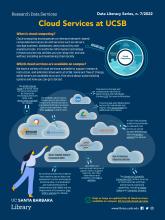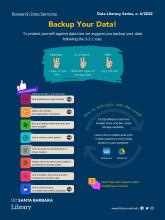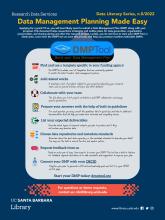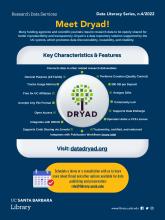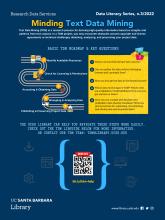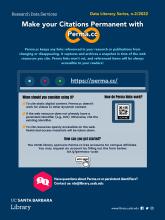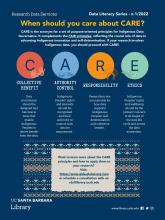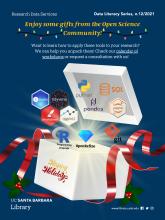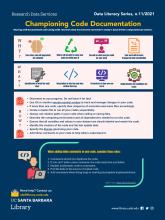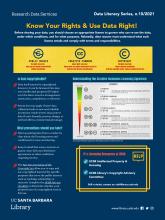A monthly series of infographics on research data
Published by the Library's Research Data Services (RDS) department, the Data Literacy Series (DLS) are visually-compelling one-page handouts that break down complex and important data-related topics. DLS complement the RDS's instructional efforts and mission to promote data education and research data management practices. The handouts are distributed under a CC BY-NC-SA 4.0 license. If you’d like to suggest a topic for an upcoming issue, please submit your feedback to rds@library.ucsb.edu.
Sign up for our Data Literacy Series and receive the infographics straight to your inbox!
Search the DLS handouts:
Cloud Services at UCSB
Cloud computing encompasses on-demand network-based computational resources and services such as servers, storage systems, databases, and productivity and analytical tools.
PDF - ALTTAGS: Cloud Computing, Cloud Services
DATE: 06-2022
Data Backup
To protect yourself against data loss we suggest you backup your data following the 3-2-1 rule.
PDF - ALTTAGS: Storage, Data Backup, Loss Prevention, Data Recovery
DATE: 06-2022
Data Management Planning Made Easy (DMPTool)
This document helps researchers strategize and outline plans for data generation, organization, preservation, and sharing during and after the research project.
PDF - ALTTAGS: Data Management, DMPTool, Funder Mandates
DATE: 05-2022
Meet Dryad
Dryad is a data repository solution supported by the UC system, which promotes data discoverability, reusability, and citability.
PDF - ALTTAGS: Data Repository, Data Archiving, Dryad, Data Publishing
DATE: 05-2022
Minding Text Data Mining
Text Data Mining (TDM) is a research process for deriving high-quality information based on insights and patterns from text corpora.
PDF - ALTTAGS: Text Data Mining, TDM, Text Analytics
DATE: 03-2022
Make your Citations Permanent with Perma.cc
Perma.cc keeps any links referenced in your research or publications from changing or disappearing. It captures and archives a snapshot in time of the web resources you cite.
PDF - ALTTAGS: Citation, Persistent Identifiers, Permanent Links, Perma.cc
DATE: 02-2022
CARE Principles
CARE is the acronym for a set of purpose-oriented principles for Indigenous Data Governance. It complements the FAIR principles, reflecting the crucial role of data in advancing Indigenous innovation and self-determination.
PDF - ALTTAGS: Data Sovereignty, Data Governance, CARE Principles, Indigenous Data
DATE: 01-2022
Open Science Community (Data Tools)
TAGS: Open Tools, Data Tools, Reproducibility, Open Source
DATE: 12-2021
Championing Code Documentation
Sharing well-documented code along with research data has become essential in today's data-driven computational science.
PDF - ALTTAGS: Data Documentation, README, Reproducibility, Code Documentation
DATE: 11-2021
Know Your Rights & Use Data Right!
Before sharing your data, you should choose an appropriate license to govern who can re-use the data, under which conditions, and for what purposes. Relatedly, data reusers must understand what each license entails and comply with terms and responsibilities.
PDF - ALT